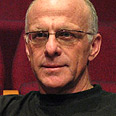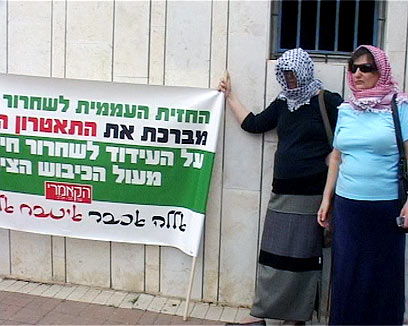
Scene from play
Photo: Merav Yudilovitch

Director Sinai Peter. 'An arena for people from both sides'
Photo: Merav Yudilovitch
A Jewish couple raises an abandoned Palestinian child. Decades later the boy's two mothers meet, and, after an agonizing and high-octane exchange, they tentatively embrace.
The scene is charged with symbolism, heightened by the fact it comes from an Israeli stage production of a Palestinian novella, and is performed by a Jewish and Arab cast to mark Israel's 60th birthday.
"The Return to Haifa", a provocative new play by one of Israel's leading theaters, explores the personal suffering behind the decades-old Middle East conflict, from both an Israeli and Palestinian perspective.
"What's so special about this production is that it gives an arena for people of both sides to listen to each other's narratives," director Sinai Peter told Reuters ahead of the opening night in Jaffa, south of central Tel Aviv.

'The Return from Haifa' (Photo: Merav Yudilovitch)
Through the stories of two couples and one child, the play evokes sympathy for both Jewish Holocaust survivors who sought a refuge in Israel, and the 700,000 Palestinians who abandoned or were driven from their homes during the 1948 war that led to the birth of the Jewish state.
Adapted by Israeli playwright Boaz Gaon from a famous novella by Ghassan Kanafani, it tells the story of Palestinians Said and Safiyeh who fled during fighting in 1948 and were forced to leave their baby boy behind.
New Jewish immigrants Miryam and Ephraim, who lost a son of their own in the Holocaust, move into the house, find the child, and raise him as their own. Two decades later, the five of them meet, and are forced to confront each other's histories.
"At the beginning it seems impossible that these people would sit down to have a dialogue," said Peter. "But the child is a sort of allegory. Who does he belong to? And there is a moment of grace where perhaps they could become one family."
More war?
The original novella ends with Said, the Palestinian father, lamenting that only another war will settle the Israeli-Palestinian problem – a sentiment writer Gaon felt was inappropriate for the modern version.
His ending is far from rosy, but it opens the door to the chance of a more peaceful future.
"The last thing I wanted was for people to leave the theater and rush to the front – we've exhausted that option," he said. "I wanted to offer an opening for something else to happen."
The play, which will move to Tel Aviv's main Cameri Theater next week, has angered some Israeli right-wingers, who held small protests ahead of the opening night.
They said work by Kanafani, who was linked to the Popular Front for the Liberation of Palestine (PFLP) militant group and was assassinated in 1972, should not be performed in Israel.

Right-wing demonstration (Photo: Idan Hovel)
"He was a killer and a terrorist," said Haim Rabinovich, who stood outside the theater dressed in a Palestinian red chequered headdress and carrying a toy gun. "This is a play for Tehran or Ramallah, not for Israel."
But audience members were enthusiastic after the opening night this week.
Nivan Kour, an Arab Israeli who also describes herself as a Palestinian, called the play a "Mirror to reality" That could help the two peoples better understand each other. Israeli Uri Yarkoni agreed.
"People need to see there are two sides to this story or we will be bombing and killing each other for another 100 years."















